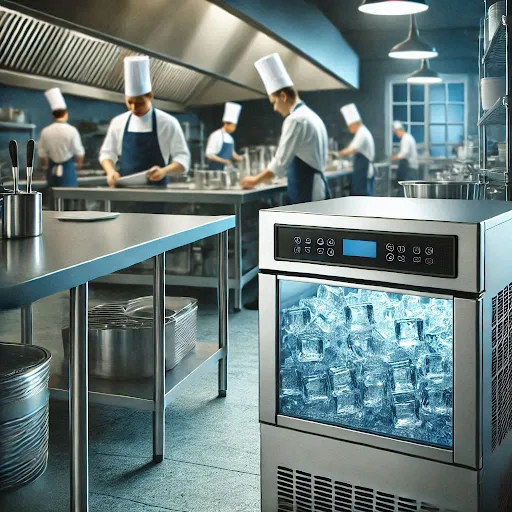4 minute read
When planning for the future, the tools you rely on matter. Commercial equipment plays a critical role in maintaining efficiency and adapting to industry shifts.
Outdated or poorly chosen machinery can limit growth. The right investments, however, bring reliability and long-term value.
Making savvy choices sets your business up not only to tackle present obstacles but also to flourish amid the constantly shifting marketplace.
Curious about the elements that truly move the needle? Stick around. We’ll break down strategies to ensure your commercial setup stays ahead of the curve.
Assessing Enduring Expenses Against Immediate Economies
Opting for the less expensive route in commercial equipment may appear prudent initially, yet it frequently results in escalating expenses as time marches on. Low-priced machinery usually comes with hidden expenses like frequent repairs or inefficient energy use.
Think of it like buying shoes that wear out quickly—you’ll end up spending more replacing them than if you had invested in durable ones up front. Quality equipment, even at a higher price point, delivers reliability and reduced maintenance needs.
Factor in warranties and service agreements when making decisions. These can offset initial costs by saving money later on repairs or replacements, giving your business better financial stability long-term while avoiding downtime from failing tools.
Understanding Industry-Specific Equipment Needs
Every industry has unique demands that require tailored solutions. Selecting the right equipment ensures your operations run smoothly while meeting customer expectations.
For instance:
- Restaurants and cafés benefit from compact, reliable tools like Scotsman Undercounter ice makers, perfect for maximizing limited space while producing consistent ice quality.
- Construction companies prioritize durable machinery capable of handling heavy workloads daily.
- Retailers often rely on point-of-sale systems with seamless integrations to track sales efficiently.
Consider factors like size, production capacity, and functionality when evaluating options for your business type.
Choosing specialized equipment isn’t just practical; it boosts efficiency and helps maintain a professional reputation in competitive markets by delivering what clients expect reliably every time.
Sustaining Equipment Longevity through Diligent Maintenance
Consistent attention to the maintenance of commercial gear is essential for its dependability. Overlooking routine servicing can result in expensive fixes or the necessity of early replacement, siphoning your financial reserves and unsettling your workflow.
Think of maintenance as an essential insurance policy—it protects your investment and keeps everything running smoothly. For instance, simple tasks like cleaning filters or lubricating moving parts extend functionality while preventing breakdowns during peak hours.
Incorporating scheduled servicing also counts as one of the most effective productivity hacks in the manufacturing world. Downtime from unexpected failures cuts into profits; proactive care ensures consistent output without interruptions.
By prioritizing routine checks, you preserve efficiency while avoiding surprises that could derail long-term business plans unexpectedly.
Choosing Energy-Efficient Options to Cut Overhead Costs
More than a fleeting fad, energy efficiency stands as a tangible method to diminish costs and enhance eco-consciousness. Investing in energy-efficient machinery not only trims down your electricity charges but also aligns with green commerce strategies, striking a chord with contemporary clientele.
When evaluating options, consider:
- Equipment certified with ENERGY STAR ratings for guaranteed lower consumption.
- Features like smart sensors or auto-shutoff functions that minimize waste when devices aren’t in use.
- The potential long-term savings from advanced models compared to outdated machines draining unnecessary power daily.
Efficiency investments often pay for themselves quickly through reduced operational costs, helping businesses manage budgets while contributing positively toward environmental responsibility—a win-win situation overall!
Leveraging Technology for Smarter Operations
Technology transforms how businesses operate, offering smarter solutions that streamline processes and reduce manual workloads. Modern equipment integrates advanced features like automation, real-time monitoring, and data analytics to optimize performance.
For example, many refrigeration systems now include IoT capabilities to track temperature changes remotely or detect issues before they escalate into costly repairs. Similarly, production lines benefit from automated controls that maintain consistency while increasing speed and accuracy in outputs.
These advancements eliminate inefficiencies by pinpointing areas for improvement instantly. Businesses adopting tech-driven tools see higher productivity levels with fewer errors. Embracing these innovations ensures your operations remain competitive while adapting easily to future challenges as industries continue evolving rapidly.
Preparing Your Business for Tomorrow’s Challenges
The right equipment decisions today lay the foundation for future success. By focusing on efficiency, durability, and innovation, your business stays ready to adapt as industries evolve.
Avoid short-term fixes that drain resources over time—invest in tools designed to grow with you. Forward-thinking choices reduce risks while opening doors to new opportunities. Preparing now ensures your operations remain resilient no matter what changes come next.





